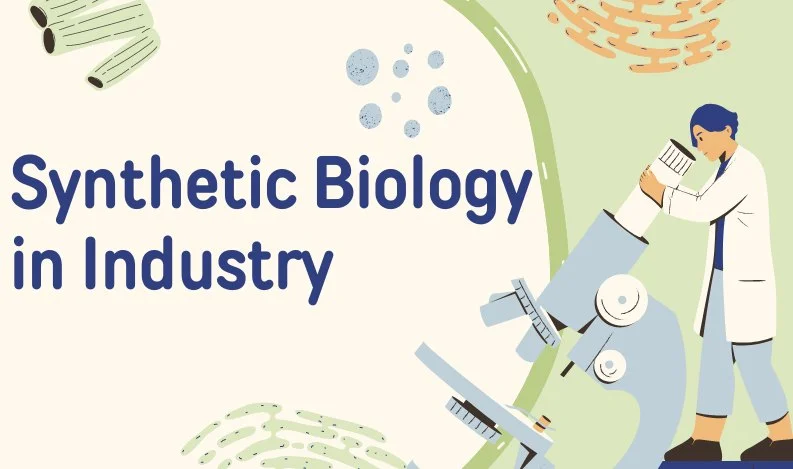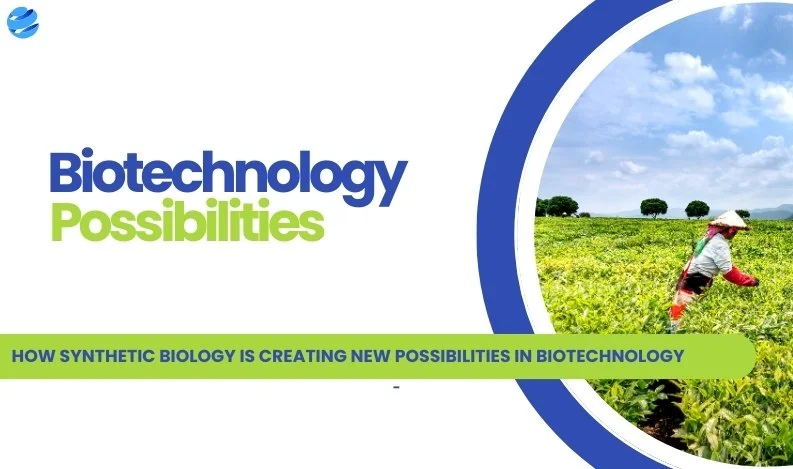Synthetic biology is a new and exciting field in science. It blends biology and engineering to create new forms of life and redesign existing biological systems. Scientists are using synthetic biology to create innovative solutions to a variety of problems, from health and agriculture to environmental protection and industrial processes. This emerging field holds immense potential to revolutionize biotechnology and create new possibilities for the future.
What is Synthetic Biology?
Synthetic biology can be compared to cooking a new recipe, but instead of using ingredients like flour and sugar, scientists use DNA, the fundamental building block of life. DNA carries genetic instructions that dictate how living organisms develop and function. By altering these instructions, scientists can create organisms with new characteristics and abilities. In essence, synthetic biology involves designing and constructing new biological parts, devices, and systems that do not naturally exist, as well as redesigning existing biological systems to perform new functions.
How Does Synthetic Biology Work?
The process of synthetic biology begins in a laboratory. Scientists identify and isolate specific DNA sequences from one organism and insert them into another. This transfer of genetic material can fundamentally change the recipient organism's properties. For example, by introducing genes responsible for bioluminescence from a jellyfish into bacteria, scientists can create bacteria that glow in the dark. Similarly, plants can be genetically modified to grow faster or withstand harsh environmental conditions. The possibilities are virtually endless, limited only by the creativity and ingenuity of scientists.
The Role of Synthetic Biology in Medicine
Making New Medicines
One of the most promising applications of synthetic biology is in the field of medicine. Scientists can engineer microorganisms, such as bacteria and yeast, to produce pharmaceuticals. For example, insulin, a hormone essential for managing diabetes, is produced using genetically modified bacteria. Prior to this technology, insulin was extracted from the pancreases of animals, a much less efficient and sustainable method. By harnessing synthetic biology, scientists can produce drugs more efficiently and at a lower cost, making life-saving medications more accessible to people around the world.
Fighting Diseases
Synthetic biology also holds great promise in the fight against diseases. Researchers are developing new ways to combat infections by creating synthetic viruses that can target and destroy harmful bacteria without harming beneficial ones. This approach, known as phage therapy, uses bacteriophages—viruses that infect bacteria—to selectively kill pathogenic bacteria. Phage therapy could provide a valuable alternative to antibiotics, which are becoming less effective due to the rise of antibiotic-resistant bacteria.
In addition to fighting bacterial infections, synthetic biology is being used to develop advanced treatments for viral diseases. For example, scientists are engineering immune cells to better recognize and attack cancer cells. This approach, known as CAR-T cell therapy, involves modifying a patient's own immune cells to enhance their ability to target and destroy cancerous cells. These innovative treatments have the potential to revolutionize the way we approach disease management and improve patient outcomes.
Synthetic Biology in Agriculture
Better Crops
Agriculture is another field that stands to benefit significantly from synthetic biology. Farmers need robust and resilient crops to meet the growing demand for food. Through synthetic biology, scientists can create crops that are more productive, nutritious, and resistant to pests and diseases. For instance, genetically modified crops can be designed to tolerate extreme weather conditions, such as drought or heavy rainfall, ensuring a stable food supply even in challenging environments.
Synthetic biology can also enhance the nutritional content of crops. For example, scientists have developed genetically modified rice, known as Golden Rice, which contains higher levels of vitamin A. This biofortified rice can help combat vitamin A deficiency, a major health issue in many developing countries.
Pest Control
Pests and diseases pose significant threats to crop yields and food security. Traditional methods of pest control, such as chemical pesticides, can be harmful to the environment and human health. Synthetic biology offers a safer and more sustainable alternative. Scientists can engineer crops to produce natural insecticides that deter pests without harming beneficial insects or the surrounding ecosystem.
Moreover, synthetic biology can be used to develop biological control agents, such as predatory insects or microorganisms, that target specific pests. These biological agents can provide effective pest control while reducing the need for chemical pesticides, promoting a healthier and more sustainable agricultural system.
Environmental Benefits of Synthetic Biology
Cleaning Up Pollution
Pollution is a major environmental challenge, and synthetic biology offers innovative solutions to mitigate its impact. Scientists are engineering microorganisms to break down and remove pollutants from the environment. For example, bacteria can be designed to degrade oil spills in the ocean, converting harmful hydrocarbons into harmless substances. Similarly, genetically modified plants can be used to absorb heavy metals and other contaminants from the soil, a process known as phytoremediation.
These bioremediation strategies harness the natural abilities of microorganisms and plants to clean up pollution in a more efficient and environmentally friendly manner. By leveraging synthetic biology, we can develop sustainable solutions to address some of the most pressing environmental issues.
Making Eco-friendly Products
Synthetic biology can also contribute to the development of eco-friendly products that reduce our reliance on non-renewable resources and minimize environmental impact. For instance, scientists are using synthetic biology to produce biodegradable plastics from renewable sources, such as plant sugars. These bioplastics break down more easily in the environment, reducing the accumulation of plastic waste in landfills and oceans.
In addition to bioplastics, synthetic biology can be used to create biofuels, which are renewable sources of energy derived from biological materials. Biofuels, such as ethanol and biodiesel, can be produced from crops or algae, providing a sustainable alternative to fossil fuels. By reducing our dependence on fossil fuels, biofuels can help mitigate climate change and promote a cleaner, greener future.
Synthetic Biology in Industry

Biofuels
The search for alternative energy sources is critical as fossil fuel reserves dwindle and environmental concerns grow. Synthetic biology offers promising solutions by enabling the production of biofuels from renewable resources. Scientists are engineering microorganisms to convert plant biomass, such as corn or sugarcane, into biofuels like ethanol and biodiesel. These biofuels can be used to power vehicles and industrial processes, providing a cleaner and more sustainable energy source.
Algae, in particular, hold great potential for biofuel production. Algae can grow rapidly and produce large amounts of oil, which can be converted into biodiesel. By optimizing the genetic makeup of algae, scientists can enhance their oil production and improve the efficiency of biofuel production. This approach not only provides a renewable energy source but also helps reduce greenhouse gas emissions and combat climate change.
New Materials
Synthetic biology is revolutionizing the development of new materials with unique properties. For example, spider silk is known for its incredible strength and flexibility. However, harvesting spider silk on a large scale is impractical. Scientists have overcome this challenge by engineering bacteria and yeast to produce spider silk proteins. These proteins can be spun into fibers and used to create a wide range of products, from lightweight clothing to medical sutures and even construction materials.
Another exciting application is the development of bioplastics. Traditional plastics are derived from petroleum and contribute to environmental pollution. In contrast, bioplastics are made from renewable biological materials, such as plant sugars or algae. These bioplastics are biodegradable and can be broken down by natural processes, reducing their environmental impact. By using synthetic biology to produce bioplastics, we can create sustainable alternatives to conventional plastics and promote a circular economy.
Conclusion
Synthetic biology is a powerful and transformative field that is creating new possibilities in biotechnology. From developing life-saving medicines and improving agricultural practices to cleaning up pollution and creating sustainable materials, synthetic biology offers innovative solutions to some of the world's most pressing challenges. As we continue to explore and expand the potential of synthetic biology, we can look forward to a future filled with exciting discoveries and advancements.
While there are challenges to overcome, the benefits of synthetic biology are immense. By fostering responsible research, promoting interdisciplinary collaboration, and establishing robust regulatory frameworks, we can harness the power of synthetic biology to create a better, more sustainable future for all. The journey of synthetic biology has just begun, and the possibilities are truly limitless.
You may also like:-
The Mysteries of Deep-Sea Ecosystems and Marine Biology
The Science Behind the Psychology of Human Behaviour
The Intersection of Physics and Technology in the Modern World
This blog delves into how synthetic biology is transforming the field of biotechnology, unlocking new opportunities in genetic engineering, medicine, and sustainability. We’ll examine the latest advancements, potential applications, and the future directions of synthetic biology, highlighting how these innovations are reshaping the way we approach scientific and medical challenges.























